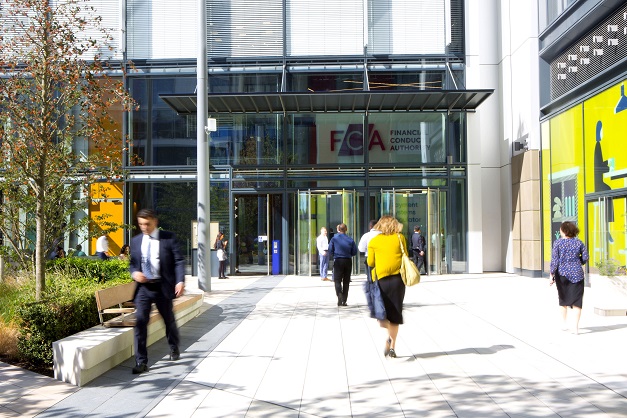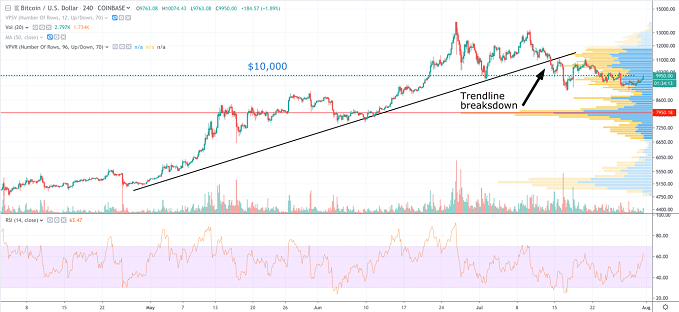FCA guidance on bitcoin and crypto regulation brings clarity
Our award-winning crypto analyst gives his view on the regulators assessment of the sector.
1st August 2019 11:01
by Gary McFarlane from interactive investor
Our award-winning crypto analyst gives his view on the regulators assessment of the sector.

UK financial watchdog the Financial Conduct Authority (FCA) has published its final guidance on cryptoassets. There were 92 responses in the consultation period and the FCA says its guidance is in line with the majority of respondents' views.
"The majority of respondents supported the proposals outlined in the consultation. The FCA is therefore publishing the Final Guidance as consulted on with some amendments to provide greater clarity on what is and isn't regulated. This includes making the important distinction as to which cryptoassets fall inside the regulatory perimeter clearer."
In the press statement today the FCA warns:
"Consumers should be cautious when investing in such cryptoassets and should ensure they understand and can bear the risks involved with assets that have no intrinsic value."
Christopher Woolard, executive director of strategy and competition at the FCA, commenting on the final guidance, wrote:
"This is a small, complex and evolving market covering a broad range of activities. Today's guidance will help clarify which cryptoasset activities fall inside our regulatory perimeter."
Which cryptoassets are regulated?
The regulator's reiteration of its previously stated view that crypto such as bitcoin have "no intrinsic value" and today's guidance bring out two types of separation in the FCA's mind.
First, the FCA is at pains to distinguish between those cryptoassets that fall within its regulatory perimeter and those that don't.
So, for example, it's not saying that crypto exchanges shouldn't be regulated but, in as far as they list "exchange tokens" (of which bitcoin would be one), such exchange activities would be beyond its regulatory perimeter.
The second kind of separation is based on what sort of token is being talked about and this also relates to intrinsic value.
The FCA divides "means of exchange" tokens such as bitcoin, Litecoin etc from security tokens that offer a return on investment in an asset, stablecoins (such as Libra presumably), or e-money tokens that have rights and obligations, with a central authority issuing tokens in return for funds (again, such as Libra presumably).
A third category of cryptoasset - the utility token – is to be largely unregulated by the FCA. Utility tokens provide access to a network service but are usually also tradeable.
Further clarifying token treatment, the FCA removed e-money tokens from appearing under the security and/or utility token headings, creating a new redefined e-money category. "This will create a specific regulated e-money token category and an unregulated category that includes utility tokens," the FCA explained.
Not a "specified investment"
So, the FCA sees bitcoin and similar coins as having no intrinsic value because of their lack of backing or claim on an income profit stream – they are not a "specified investment" and therefore remain unregulated.
As a consequence, investments in bitcoin and other unregulated cryptoassets are not covered by the Financial Services Compensation Scheme and consumers have no recourse to the Financial Ombudsman Service.
However, bitcoin's supporters often argue that far from having no intrinsic value, it is "backed" by its network and is increasingly used as a store of value, admittedly in discrete, niche circumstances.
Notwithstanding the fact that the vast majority of bitcoin transactions at this juncture are speculative as opposed to means of exchange, bitcoin is a computer network that has never had an outage or downtime and has transferred value to the tune of hundreds of billions of dollars since its birth 10 years ago.
Bitcoin is currently trading at $9,968 according to data and analytics site cryptocompare.

BTC/USD 4-hour candle, Coinbase, 31 July 2019. (Courtesy TradingView)
Crypto Wild West
Bitcoin is therefore best viewed as a form of commodity money at this stage, where its intrinsic value is bounded by the cost of mining and the size of its network.
The FCA acting on its duty to protect the consumer in the "Crypto Wild West" is welcome, albeit a bit late some might say. Nevertheless, the fact that so much that should be regulated is currently beyond its purview as laid down by legislation should be of more concern.
To be fair the FCA recognises that new laws are coming down the road in the shape of the G7's Financial Action Task Force recommendations. It should also be noted here that Facebook’s Libra has focused the minds of legislators, central bankers and other supervisory bodies as far as regulating all things crypto are concerned.
Although extremely high-risk and hyper volatile, cryptoassets have nevertheless entered the cultural zeitgeist, if not into our wallets to pay for things or on the horizon of most mainstream investors.
Both the FCA's announcement today, which puts it in the vanguard globally to some extent regarding many aspects of crypto regulation in a major economy, and the wraps coming off Facebook’s Libra, are probably net positive for crypto.
Compliance costs are going to rise though, and that will further accelerate consolidation in the crypto industry, putting bigger firms at an advantage, especially where exchanges are concerned.
Bitcoin here to stay
Crypto is not going away, primarily at this point because bitcoin is not going away.
Economic uncertainty and fissures in the financial system, the US-China trade war, of which Hong Kong may be the latest front, and geopolitical tensions more widely, are supporting bitcoin's price. In addition, there's the strengthening network fundamentals, such as the halving in bitcoin reward payments to miners to 6.25 Bitcoin per block looming in May next year.
If you want to hedge against all the economic and geopolitical noise – for different individuals and companies in different places and for varied different reasons – bitcoin's attraction as "digital gold" is strengthening.
However, as an alternative asset class it should only make up 1% to 5% of net worth. Selling your house to buy bitcoin, as a man in the Netherlands did in the boom and bust of 2017, would not be a balanced portfolio approach!
Looming large over the FCA's work is Facebook's Libra. Even if Facebook’s global money never gets out of the door, it has still succeeded in throwing down the gauntlet to the financial industry, US Big Tech and China's leadership position in digital payments.
These articles are provided for information purposes only. Occasionally, an opinion about whether to buy or sell a specific investment may be provided by third parties. The content is not intended to be a personal recommendation to buy or sell any financial instrument or product, or to adopt any investment strategy as it is not provided based on an assessment of your investing knowledge and experience, your financial situation or your investment objectives. The value of your investments, and the income derived from them, may go down as well as up. You may not get back all the money that you invest. The investments referred to in this article may not be suitable for all investors, and if in doubt, an investor should seek advice from a qualified investment adviser.
Full performance can be found on the company or index summary page on the interactive investor website. Simply click on the company's or index name highlighted in the article.